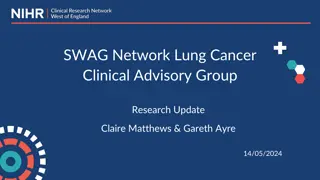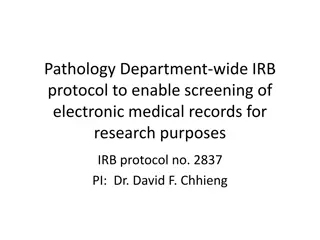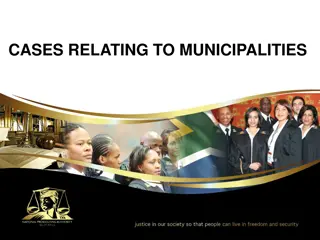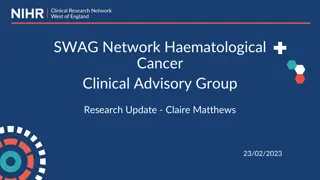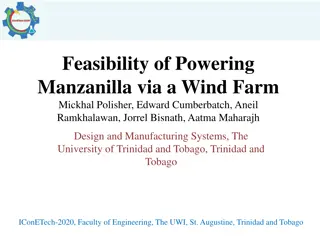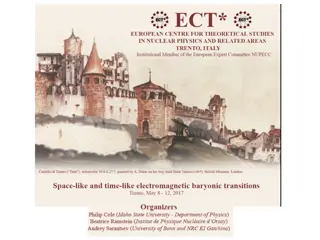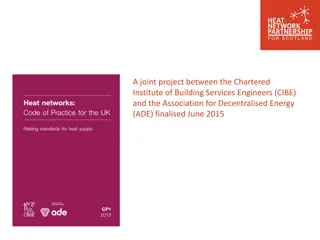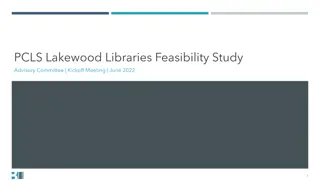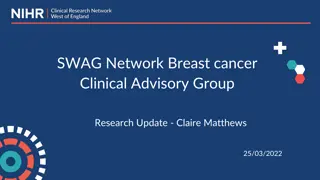Update on Feasibility Studies for University Development in Hammanskraal and Ekurhuleni
Feasibility studies have been conducted to establish universities in Hammanskraal for Policing and Crime Detection and Ekurhuleni for Science and Innovation. The studies recommended further work on infrastructure and academic programs. The potential university in Hammanskraal would positively impact the professionalization of the police service and crime prevention. Progress has been made in determining site suitability, financial modeling, and academic program planning.
Download Presentation

Please find below an Image/Link to download the presentation.
The content on the website is provided AS IS for your information and personal use only. It may not be sold, licensed, or shared on other websites without obtaining consent from the author.If you encounter any issues during the download, it is possible that the publisher has removed the file from their server.
You are allowed to download the files provided on this website for personal or commercial use, subject to the condition that they are used lawfully. All files are the property of their respective owners.
The content on the website is provided AS IS for your information and personal use only. It may not be sold, licensed, or shared on other websites without obtaining consent from the author.
E N D
Presentation Transcript
Update on the feasibility studies report into the establishment of universities Policing and Crime Detection in Hammanskraal and Science and Innovation in Ekurhuleni. 28 FEBRUARY 2024
CONTENTS 1. 2. Background Phase 1 Feasibility Studies Planned programmes Cost and Start Date Phase 2 Feasibility Studies Conclusion 3. 4.
BACKGROUND The President announced in the SONA speech on 13 February 2020, that the Department will build two new higher education institutions; one in Ekurhuleni for Science and innovation and one in Hammanskraal for Policing and Crime Detection. The Minister approved the project steering committee comprising of the different Departments and Academics who worked towards the finalization of the phase 1 of the studies. The Phase 1 feasibility studies were completed in September 2022. The studies recommended further work to be done in relation to the infrastructure and academic enterprise including the naming of the university. The Minister consulted with the Minister of Police who advised that the Police institution should not be named as a Higher Education College but be a fully fledged University of Policing and Crime Detection. The Director General approved the appointment of the Project Manager who was part of the Phase 1 of the feasibility studies to ensure acceleration of the feasibility process.
PHASE 1 FEASIBILITY STUDIES Initial feasibility studies (Phase 1) were concluded in September 2022. The focus of the Phase 1 studies was on The vision , mission and academic mandate of the new institutions; The evolutionary growth during the incubation period and the associated governance implications; Lessons learnt from existing education and training models internationally and in South Africa; Suitability of the identified sites Financial modelling Possible Academic programmes Amongst the key issues coming out of Phase 1 studies: University of Policing and Crime Detection The site in Hammaskraal is ideal for the institution It is Government owned which will limit challenges related to transfer of ownership There is available bulk infrastructure where the site is located. However, supply shortages require intervention There an is urgent need for the institution as it would impact positively on the professionalisation of the police service and crime prevention.
PHASE 1 FEASIBILITY STUDIES University of Policing and Crime Detection Site and Regional Accessibility
PHASE 1 FEASIBILITY STUDIES University of Science and Innovation The site is ideal as it is In a central and highly visible location, with potential to establish an iconic identity overlooking the town. Occupies a place of commanding distinction and presence in relation to the wider City of Ekurhuleni that will accentuate the university s stature, dignity, and pride of place. Is well located, integrated and accessible within the town of Boksburg. Is large enough to support expansion well into the future. It is Government owned which will limit challenges related to transfer of ownership
PHASE 1 FEASIBILITY STUDIES University of Science and Innovation Site location
PLANNED PROGRAMMES. The studies have proposed the qualification mix as Reflected below: University of Policing and Crime Detection NQF level Qualification type 5 Higher Certificate in Police Science/ Police Studies/ Policing 6 6 7 Advanced Certificate in Police Science/ Police Studies/ Policing Diploma in Police Science/ Police Studies/ Policing Bachelor of Police Science/ Police Studies/ Policing Postgraduate Diploma in in Police Science/ Police Studies/ Policing* Master of Police Science/ Police Studies/ Policing (Coursework)* Doctor of Philosophy in Police Science/ Police Studies/ 8 9 10
PLANNED PROGRAMMES. The studies have proposed the qualification mix as Reflected below: University of Science and Innovation NO. 1 PROGRAMME HCert Green-energy Technologies 2 HCert Technology-driven Agro-Processing 3 4 Dip Tech-driven Smart Transport & Logistics AdvDip Air Traffic Control 5 AdvDip in Aeronautical Information Management 6 7 AdvDip Tech-driven Smart Transport & Logistics B ICT 8 9 BEngTech Aerospace, Aeronautical & Astro. Eng BEng SMART Manufacturing 10 11 12 PGDip SMART Manufacturing PGDip Artificial Intelligence PGDip in Air Traffic Management 13 14 MEng SMART Manufacturing MEng Artificial Intelligence 15 MEng Aerospace, Aeronautical & Astro. Eng.
COST AND START DATE The Studies also made financial assumptions which indicated that: University of Policing and Crime Detection predicts that the institution which is aimed to grow to approximately 2700 students and 276 staff members over the first ten years, will: Trade at a deficit for at least the first ten years of operations of the institution. Record a cash flow shortfall for at least the first twelve years of the institution's operations. Require at least R400 million in ad hoc grant funding over the first twelve years of operation. University of Science and innovation predicts the institution which is projected to grow to approximately 2000 students and 180 staff members over the first ten years, will: Trade at a deficit for at least the first five years of operation. Record a cash flow shortfall for at least the first nine years of operation. Require at least R420-million in ad hoc grant funding over the first nine years of operation. The projected cost relate to the operations and exclude the infrastructure cost which will be be part of the second phase of the studies.
PHASE 2 FEASIBILITY STUDIES The scope on Phase 2 further extends to the following activities: Conducting an audit of the qualifications, expertise, and capacity of existing staff at Hammanskraal police academy to determine skills gaps and requirements for the new higher education institutions and developing a talent acquisition model; Exploring the feasibility of establishing collaborative partnerships and/or a consortium with universities already offering postgraduate qualifications with various specialisations in crime and policing studies; Conducting international benchmarking to assess the enhancement of education and training through next-generation technologies; Investigating the various modalities of articulation pathways between the TVET (technical, vocational, educational, and training) sector and the new higher education institutions; and Exploring the development of articulation pathways at the postgraduate level between the new higher education institutions and partnering universities. Infrastructure planning and phasing of the construction and building rehabilitation.
PHASE 2 FEASIBILITY STUDIES The scope on Phase 2 has been summarised into four broad areas, namely, Academic Financing Governance and Administration Location and Infrastructure The Department has submitted a Cabinet memo highlighting the Phase 1 progress and a need for financial security so as to commence with the projects.
CONCLUSION The Department has identified the finalization of the concept designs as critical milestone towards the commencement of the projects. Cabinet Memo has been submitted and it is hoped that it will guide the acceleration of the process. The project manager is finalising a work plan towards implementation of the projects from 2025. The financing of the projects still remains a challenge, particularly, in the context of cost containment measures.






